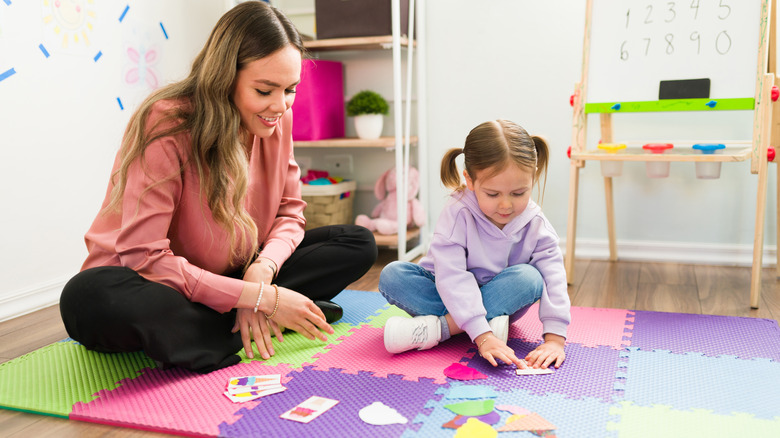What Is Play Therapy And What Are Its Benefits?
Do you ever feel your own "inner child" come out while playing a game with a child? As adults, we can reconnect with our childhood innocence by engaging in play. For children, play is the primary outlet through which they express their emotions, and is significant to their future development. Even if a child cannot express their feelings through words, it doesn't mean they don't still have them, which is where play can come in. As reported by Healthline, there is a unique form of therapy — known as "play therapy" — that incorporates play in a therapeutic setting and is geared toward children and some adults. Since children are incapable of articulating their emotions in the same way adults can, play therapy can help them express themselves in a way that feels natural to them at their current stage of development.
With a licensed mental health professional, such as a psychologist or social worker, a child can use toys as a tool to creatively act out their feelings. One advantage to play therapy is that there are many techniques a mental health professional could utilize for the child's treatment plan. According to Positive Psychology, they can use dolls, puppets, storytelling, dance, and drawing, among various other approaches. Some techniques can be tailored for children with specific developmental needs, such as children with autism or attention deficit hyperactivity disorder (ADHD).
The desire to play doesn't magically disappear once a child reaches adulthood, which is why some adults can also benefit from play therapy.
Play therapy can be for adults too
Some adults can find therapeutic comfort through play, just like children. According to Good Therapy, play therapy is an effective technique, even for adults, that's supported by research in the neurophysiology and molecular biology fields. In particular, play therapy can be a useful tool for treating adults who have dementia, post-traumatic stress disorder, anxiety, depression, or obsessions and compulsions. Furthermore, adults who struggle with unresolved trauma from their childhood may find that they also have a positive experience with play therapy, as reported by Healthline.
If someone is experiencing grief from a significant loss in their life, play therapy could be beneficial for them as well. In order to help adults express their repressed feelings or traumas, trained mental health professionals may use art therapy, music therapy, role-playing, or dance therapy. Alternatively, they may integrate the sand tray technique, which is a method where individuals can place miniature objects and figurines in a sand tray to depict a story of their lives and their innermost feelings, as explained by Medical News Today.
Much like other therapy approaches, there are several benefits for a child or adult who engages in play therapy — but what are these benefits exactly?
How can play therapy benefit someone?
When you think of your own childhood memories of playing with your friends and family, you might be able to picture tons of fun and laughter. For many people, playing is a positive experience, which might explain why it can have a number of social and emotional benefits.
Even ancient thinkers, like Plato and Socrates, could recognize the importance of play. According to Inside Classical Education, Socrates wrote about how education begins with play, and Plato similarly suggested that play is how children learn. They further discuss how learning can be strengthened through play, which is supported by neuroscientific research studying the relationship between play and greater synaptic growth in neurons in the brain. In addition, play can have benefits for someone's overall health and well-being, as shared by Good Therapy.
The Association for Play Therapy states that children who participate in play therapy have shown a more developed sense of responsibility, self-acceptance, and acceptance of others, improved social skills and empathy, and a better understanding of how to express their emotions.
Adults who attend play therapy are able to learn how to open up in a relaxed setting and how to cope with their traumas, as reported by Counseling Today. For instance, Chris Johnson, a licensed professional counselor intern who works with battered women and their children, tells Counseling Today that play therapy has been beneficial for her adult clients who have experienced domestic violence, allowing them to have emotional breakthroughs about their thoughts and feelings associated with the abuse.



